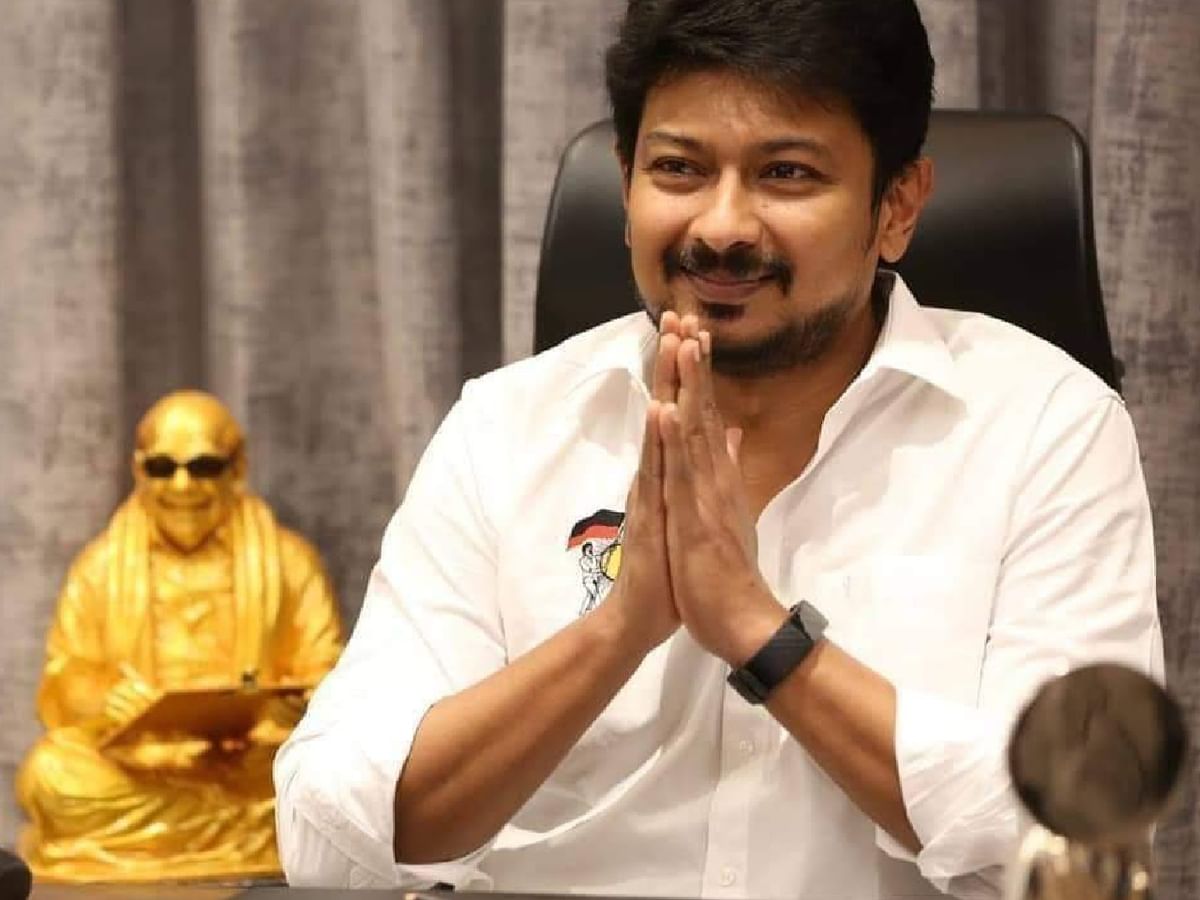


Udhayanidhi Stalin, the third generation leader of the influential M Karunanidhi family, was recently elevated to the position of Deputy Chief Minister of Tamil Nadu. As he made his way through the DMK's diamond jubilee meeting, the top leaders of the party and its alliance parties stood up in reverence, signaling their support for his swift ascent to power. However, one leader, who was sitting while everyone else was standing, seemed to only offer a half-hearted acknowledgment of Udhayanidhi's growing influence. His rise to power, despite the political experience and seniority of others, reveals the enduring power of familial dynasties in Indian politics.
Udhayanidhi Stalin: The Rise of a Political Dynasty in Tamil Nadu
Udhayanidhi Stalin, son of former Tamil Nadu Chief Minister M.K. Stalin and grandson of late Chief Minister M. Karunanidhi, has rapidly ascended the political ranks, recently being appointed Deputy Chief Minister of the state. While his elevation has been met with support from within the ruling DMK party, it has also raised questions about the role of political dynasties in Indian politics.
Background:
The Karunanidhi family has dominated Tamil Nadu politics for decades. M. Karunanidhi, the patriarch of the family, served as Chief Minister five times and led the DMK for over 50 years. His son, M.K. Stalin, succeeded him as Chief Minister in 2021.
Udhayanidhi, a film producer and actor, entered politics in 2017. He quickly rose through the ranks, becoming an MLA (Member of Legislative Assembly) in 2019 and winning re-election in 2021. His appointment as Deputy Chief Minister has made him one of the most powerful politicians in the state.
Significance:
Udhayanidhi's appointment is significant for several reasons. First, it underscores the enduring power of political dynasties in India. Despite the efforts to promote meritocracy, familial connections still play a major role in determining political success.
Second, it reflects the DMK's strategy of promoting young leaders from within the Karunanidhi family to secure its long-term political future. Udhayanidhi's appointment is seen as a move to consolidate the family's hold on the party and the state.
Criticism:
Udhayanidhi's elevation has also faced criticism. Some argue that he lacks the political experience and qualifications to hold such a high office. Others question the fairness of dynastic politics, which they believe limits opportunities for non-politically connected individuals.
Top 5 FAQs:
1. Who is Udhayanidhi Stalin? A: He is the son of former Tamil Nadu Chief Minister M.K. Stalin and grandson of late Chief Minister M. Karunanidhi.
2. What position does he hold? A: Deputy Chief Minister of Tamil Nadu.
3. How did he rise to power? A: Through a combination of familial connections and his own political activity.
4. Why is his appointment controversial? A: It underscores the role of political dynasties in Indian politics and raises questions about his experience and qualifications.
5. What are the implications of his rise for Tamil Nadu politics? A: It could strengthen the Karunanidhi family's control over the state and perpetuate dynastic rule.

The Pasighat police in East Siang district, Arunachal Pradesh have arrested the 33-year-old boys' hostel warden of Sanggo English School for sexually assaulting minor students. This came to light when a student was hospitalized for urogenital complications. The incident has sparked outrage from parents and the public, demanding strict action against the accused warden. In response, the Arunachal Pradesh State Human Rights Commission (APSHRC) has taken suo motu cognisance and ordered for a detailed report on the investigation, victim protection, and school management.

Actress Siddiqa Begum, daughter and legal heir of Shah Bano, has served a legal notice on the makers of the upcoming Bollywood film 'Haq'. The notice states that the film's unauthorized depiction of the personal life of Shah Bano without the consent of her legal heirs is a violation of their rights. 'Haq' is based on the landmark 1985 Supreme Court case that granted maintenance to Shah Bano, a Muslim woman, from her divorced husband.

After four years, the 'Darbar Move' tradition in Jammu and Kashmir has been restored, fulfilling the promise of the government and bringing a boost to the economy. National Conference chief Farooq Abdullah expressed happiness, noting that those who sought to separate Jammu and Srinagar have failed. Chief Minister Omar Abdullah received a warm reception and inspected the secretariat premises after the ceremony, as security in the region was heightened for the occasion.

Delhi Legislative Assembly Speaker Vijender Gupta praised Swami Dayanand Saraswati as not just a saint and reformer, but also a pivotal figure in India's freedom struggle. Speaking at the International Arya Samaj Conference, Gupta highlighted how Swami Dayanand's teachings sparked a revolution that led to the nation's independence. The event was attended by esteemed guests including Gujarat Governor Acharya Devvrat and top officials from the Arya Samaj community, all paying tribute to the enduring impact and legacy of Swami Dayanand Saraswati.

The Metro Railway Kolkata has announced a major schedule expansion for its Yellow Line, which runs between Noapara and Jai Hind Bimanbandar (Airport) in Kolkata. Starting from 3 November, weekday operations will increase to 120 services with extended operating hours, providing greater convenience and accessibility to commuters. Weekend travellers will also see a significant frequency upgrade, making travel on Saturdays and Sundays hassle-free. This move is expected to improve the overall public transportation system in the city and benefit the commuters.

Despite some reassurances that online verticals focused on diversity will continue, NBC News has announced a round of layoffs that will impact about 150 employees, or 2% of their workforce. The cuts are said to be a result of cost-cutting measures in preparation for the split of Comcast's cable networks into Versant. This move signifies a shift in priorities for NBC management, prioritizing corporate profits over hard-working members, according to Susan DeCarava, president of The NewsGuild of New York. This change also means that MSNBC will no longer lean on NBC News for newsgathering, with those ties expected to be severed next week.

The Kasibugga Venkateswara Temple in Srikakulam district was the site of a heart-wrenching stampede, causing multiple fatalities and affecting the community deeply. Chief Minister N. Chandrababu Naidu has expressed his sorrow over the unfortunate incident, as well as directing officials to ensure that those injured receive the best medical treatment possible. As local officials and public representatives are called to oversee relief operations, swift action is required to aid those affected and manage the situation effectively.

Indian Prime Minister Narendra Modi inaugurated the Shanti Shikhar Academy for Peaceful World in Raipur, praising the Brahma Kumaris organization for bridging India's ancient wisdom with the world's search for harmony. He credited the group's selfless service and spiritual discipline for their efforts towards universal peace. He positioned the Brahma Kumaris as protectors of India's soul and highlighted India's proactive role in addressing global crises such as disaster relief and environmental threats.

In an act of solidarity and protest, millions of Muslims in India used their Friday prayers to denounce the recent killings that took place in Pahalgam. The news comes amid growing tensions between the Muslim community and the Indian government. Many are viewing this as a sign of unity and determination from the Muslim population in India.

The state of Karnataka, or Kannada Rajyotsava, marked its 69th anniversary with a grand ceremony organized by the district administration in Mangaluru. District in-charge minister Dinesh Gundu Rao paid tribute to the leaders and writers who fought for a unified Kannada state and presented awards to 80 outstanding individuals and organizations. In his address, the minister highlighted the rich cultural and historical heritage of Karnataka and called for a sense of pride among its citizens.